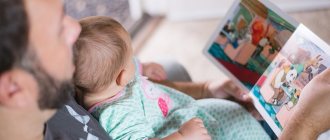Mothers who are raising a child without the participation of a father, recognized as a single parent, often experience difficulties in providing the baby with everything necessary and devoting the proper amount of time to him. To solve possible difficulties, the state has provided a number of real assistance measures: various benefits, subsidies and payments are designed to help improve the living conditions of single-parent families.
This detailed material will discuss all types of benefits that a single mother with Russian citizenship can count on in 2021.
Benefits for single mothers in 2021 in Moscow
- Applicant's passport;
- Child's birth certificate;
- Certificate from the registry office (form No. 25);
- Certificate of income (form 2-NDFL);
- Certificate of family composition;
- Extract from the work book, if the applicant works;
- Certificate from the employment center, if the applicant is unemployed;
- Statement of family composition and missing debts.
The list presented is expanded. Depending on the incentive or benefit, fewer documents may be needed (for example, for a one-time benefit for the birth of a child, a 2-NDFL certificate is not needed).
The Supreme Court ruled that the status of a single mother remains after her marriage if the new husband has not adopted a child in accordance with paragraph 2 of Article 51 of the Family Code.
After marriage, a woman has the right to remain a single mother. But to take advantage of benefits at work, you will need to notify your employer.
If previously it was necessary to receive benefits and submit documents for it only at the place of registration, now this rule has been changed. Now you can apply for benefits at your place of stay and actual residence. The benefit depends more on regional regulations.
A distinctive condition for the assignment of benefits is that they are tied to the age of the baby, and less often - the mother (payments for “young families”). Reaching the age limit means that cash assistance will be canceled from the next date.
Due to the fact that a fairly large number of benefits are provided for single mothers, it is impossible to say unambiguously what age is the only maximum allowable.
Many subsidies are allocated to the youngest group of children, and are designed for persons under 1, 5, 3 or 7 years old . It is their upbringing that requires a significant level of income, and the woman cannot work due to being on vacation or the child’s frequent illnesses. The older the child gets, the smaller the amount of compensation and government support options available.
Maximum age is 18 years. But if the child decides to continue studying full-time, the payment can be extended until the age of 23.
The state provides various options for benefits and compensation that help ensure the development and education of the child financially. Part of the payments is assigned on a monthly basis, the rest can be received only once.
- Monthly allowance for student families with children and certain categories of students – 4 000
.Distributed by:
- for families with children in which both parents are students;
for students who are orphans and children without parental care;
- for students recognized as disabled;
- on students exposed to radiation as a result of the disaster at the Chernobyl nuclear power plant;
- for students who are combat veterans;
- for students from large families;
- for students from single-parent families (families in which the student lives with an unmarried parent, as well as an unmarried student raising a child);
- for students who have a disabled or retired parent.
- A gift set or cash payment for the purchase of items and means intended for the care of newborn children – 20 000
. - Monthly allowance for disabled children – 7 901
.Disabled children are entitled to benefits:
- having one parent;
living in families with an average per capita income, the size of which does not exceed the subsistence level in the Moscow region.
- Annual cash payment for a disabled child studying in a state educational organization in the Moscow region - 13 020
. - Monthly cash payment to provide adequate nutrition to pregnant women, nursing mothers, and children under three years of age:
- 1 000
– children under 1 year of age; - 600
– children aged 1 to 3 years; - 400
– pregnant women; - 1 000
- nursing mothers.
The benefit is paid to students from low-income families receiving full-time higher education for the first time. Orphans; children left without parental care; disabled people are paid this benefit without taking into account the average per capita family income.
Single mother benefit in 2021
- One-time maternity benefit for working women - Depends on salary
- One-time benefit to working women for registering in the early stages of pregnancy - 708,23
- One-time maternity benefit, per month - 708,23
- Benefits for women registered with medical organizations in the early stages of pregnancy - 708,23
- Working conditions for pregnant women. This includes a reduction in production standards, a reduction in working hours, a ban on dismissal and other concessions.
- Birth certificate (required for all women) - in the amount of 12,000 rubles
.A birth certificate allows a woman to choose a medical institution where she will be observed during pregnancy, give birth, and observe the child.
- One-time benefit for the birth of a child - 18 886,32
- Monthly allowance for child care up to one and a half years old for working women - Depends on salary
- Minimum monthly allowance for child care up to one and a half years - 7 082,85
- Monthly payment in connection with the birth (adoption) of the first child (up to 3 years) - 13 317
(Regional cost of living in the Moscow region for children for the 2nd quarter of 2021).Paid to low-income families (average per capita family income should not exceed 2 times the regional subsistence level of the working-age population for the 2nd quarter of 2021).
- Monthly compensation payment to mothers with children under three years of age (at the expense of the employer) - 50
Since 2021, this payment has been canceled. The right to receive it remains with the following citizens: - for whom payment was scheduled before 01/01/2020;
those on parental leave born no later than December 31, 2019 (we are talking about relatives actually caring for the child and military women).
(50% of the regional subsistence level in the Moscow region for children for the 2nd quarter of 2021).
Paid from the federal and regional budgets if the average per capita family income does not exceed the subsistence minimum per capita established in the constituent entity of the Russian Federation for the 2nd quarter of 2021.
- A one-time allowance for the pregnant wife of a serviceman undergoing military service on conscription - 29 908,46
; - Monthly allowance for the child of a soldier undergoing military service on conscription - 12 817,91
- Monthly allowance for children of military personnel and employees of certain federal executive authorities who were killed (deceased), missing in action while performing military service duties (official duties) - 2 565,93
.The benefits are assigned by the pension authorities of the Ministry of Internal Affairs of the Russian Federation at the place of receipt of the survivor's pension. The benefit has been indexed since 01/01/2021 (indexation coefficient - 1.037).
- Annual allowance for summer recreational recreation for children of conscripted military personnel and employees of certain federal executive authorities who died in connection with the performance of tasks in the context of an armed conflict in the Chechen Republic (in the North Caucasus) - 27 224,52
- Maternal (family) capital:
- 483 881,83
- if the right to maternity capital arose before 01/01/2020 - 483 881,83
- for the first child in the event of his birth (adoption) starting from 01/01/2020. Maternity capital increases by 155,550 rubles in the case of the birth (adoption) of a second child starting from 01/01/2020, provided that the first child was born (adopted) no earlier than 01/01/2020 (total - 639,431.83 rubles) - 639 431,83
- for the second or third child or subsequent children in the event of his (their) birth (adoption) starting from 01/01/2020, provided that the right to maternity capital did not previously arise. - Monthly payment from maternity capital for the second child (up to 1.5 years) - 13,317
(Regional cost of living in the Moscow region for children for the 2nd quarter of 2021)
Early pension for mothers of many children and citizens raising disabled children
In order for a mother of many children or a citizen raising a disabled child to retire early, certain conditions must be maintained: the woman gave birth and raised 5 or more children before they reached the age of 8 years and the woman must have at least 15 years of insurance experience.
According to the law, when determining the amount of insurance experience, periods of care for each child individually will be taken into account until they turn 1.5 years old. This should add up to 6 years.
It is important to know! If a single mother with many children, having raised 5 or more children at the time of filing an application for early assignment of an old-age pension, does not have 15 years of insurance experience, then, in order to determine the right to receive a pension, the following can be counted in the insurance experience:
- child care up to 1.5 years old. In total, no more than 6 years will be counted, that is, for 4 children;
- periods of caring for a disabled child;
- period of care for a disabled person;
- mother's periods of study.
Benefits and allowances for single mothers in the Moscow region in 2021
The largest list of benefits and guarantees for single mothers is provided for by the labor law of the Russian Federation. All of them relate to the specifics of the work schedule and the right of priority upon dismissal.
Working single mothers can count on:
- the right to refuse night shifts, business trips and overtime work;
- additional 14 days of vacation at your own expense (if specified in the employment contract);
- part-time work week or reduced work day (the child must be no more than 14 years old);
- protection from dismissal at the initiative of the employer (if there is a child under 14 years of age and there are no violations of labor discipline and other cases).
Federal legislation does not provide for separate benefits for single mothers - benefits for single mothers do not differ from payments for children raised in a two-parent family. However, such surcharges and assistance are often set at the regional level.
Payments and benefits for single mothers
Discounts on kindergarten fees, the right to priority admission to kindergarten, free meals in schools, subsidies for housing services, and more may also be provided at the regional level.
Monthly child benefit for a single mother
To whom:
Single-parent families
Age:
up to 1.5 years, from 1.5 to 3 years, from 3 to 8 years, from 8 to 16 years
Size:
6,606.00 - 1,136.00
Frequency:
monthly
Monthly allowance for a child from 7 to 16 (18) years of age for a single mother
To whom:
Single-parent families
Age:
up to 1.5 years, from 1.5 to 3 years, from 3 to 8 years, from 8 to 16 years
Size:
1,136.00
Frequency:
monthly
Monthly allowance for a child from birth to one and a half years old for a single mother
To whom:
Single-parent families
Age:
up to 1.5 years
Size:
4,546.00
Frequency:
monthly
Monthly allowance for a child from birth from one and a half to 3 years old to a single mother
To whom:
Single-parent families
Age:
up to 1.5 years, from 1.5 to 3 years
Size:
6,606.00
Frequency:
monthly
Monthly allowance for a child from 3 to 7 years old for a single mother
To whom:
Single-parent families
Age:
from 3 to 8 years
Size:
2,273.00
Frequency:
monthly
February 13, 2021
In anticipation of the opening: an interview with an employee of the Scientific and Practical Rehabilitation Center
February 12, 2021
“Time of the First”: a family teen club returns to full-time work
February 12, 2021
Activists of the social center in Chertanovo North shared their plans for February
February 11, 2021
Who is Mister Jacob? The leader of the English language club spoke about his life
February 11, 2021
Capital psychologists will hold free webinars on personal growth
February 10, 2021
Let us say right away that the legislation does not define the terms “single mother/father” and “single parent”.
For each benefit or payment, the circle of recipients is determined individually.
For example , in the field of labor relations
The only parent is a person who raises a child alone, but there is no second parent - he died or was deprived of parental rights. Moreover, if the mother and father are divorced, then the spouse with whom the child remains is not recognized as the only parent. It should also be noted that labor legislation uses only the term “single mother,” although courts apply the same benefits in the field of labor relations to fathers raising children alone.
In tax legislation
the term “single parent” is used. It is understood as a person who raises a child independently from a financial point of view, without the participation of others. That is, if a woman gave birth to a child “for herself,” the spouse died or was deprived of parental rights.
Additional payment for single mothers raising a disabled child
Single mothers raising a disabled child have a number of benefits and can qualify for monthly payments from the state. What social supplements are available to mothers who support disabled children? These are monthly benefits for a non-working single mother.
If the mother of a disabled person can work, but is deprived of this due to the need to care for her disabled child (or a child with HIV status), then she receives an appropriate benefit. Its size in 2021 is 7,900 plus indexation of 4%. And in 2021, the allowance for a single mother raising a disabled child should be 8,216 rubles. However, this amount may vary depending on the place of residence, according to regional programs.
If guardianship has been granted to a disabled child, then the amount of this benefit is already 2,000 rubles.
If a disabled child is raised by a single mother who also has a disability, then she has the right to receive an increased pension.
Labor and social pensions increase if a single mother becomes disabled, which led to partial or complete loss of ability to work, while raising a disabled child. The size of pension payments will depend on the number of disabled children raised by a single mother with a disability.
Single mothers have the right to regional supplements provided for by different programs for each individual region. To find out exactly what a single mother with a disabled child is entitled to in their city, you need to call the Pension Fund and the social welfare department.
There are also a number of social guarantees for single mothers with disabled children: the mother of a disabled child has every right to work fewer hours per week, that is, part-time work, until the disabled child turns 16 years old. Also, the mother of a disabled child has the right to 4 additional days off, which are legally paid to her by the employer, like working days. An employer cannot unilaterally terminate an employment contract with a single mother who is supporting a disabled child. An employer does not have the right by law to involve a single mother raising a disabled child on business trips and working overtime. Forced overtime and work on weekends without the mother's consent is prohibited.
A single mother with a disabled child can apply for a pension from the age of 50 if she was involved in raising him when he reached 18 years of age.
Also, single mothers with disabled children in their arms can claim compensation for housing and communal services in the amount of 50% of all payment amounts.
A single mother with a disabled child can receive social housing from the state if their family needs more living space. To do this, you must contact the social security service at your place of residence with a corresponding application, a sample of which must be issued on the spot.
A single mother can use public transport free of charge when acting as a chaperone for her disabled child.
Please note that mothers of many children and citizens raising disabled children may qualify for early singing.
All types of payments for single mothers
Labor benefits for single parents are established by the Labor Code of the Russian Federation and the terms of the collective agreement
.
The Labor Code provides for single mothers or fathers raising children under 14 years of age (disabled children under 18 years of age) the following guarantees and benefits:
- a ban on dismissal at the initiative of employers, with the exception of liquidation of the organization, gross violation of labor regulations or “under the article”;
- prohibition on engaging in overtime work, night work or on weekends without the employee’s consent;
- additional leave without pay up to 14 days per year (according to a collective agreement);
- a ban on sending on business trips without the employee’s consent, provided that the employment contract does not indicate the traveling nature of the work;
- establishing preferential working conditions, for example, part-time work if there are children under 10 years of age, choosing a schedule for shift work, banning work in the evening.
It is worth noting that in accordance with Article 262.2 of the Labor Code of the Russian Federation, a single parent raising three or more children has the right to take leave at a time convenient for him. But the legislator provided for one caveat - all three children must be under the age of 12.
The only tax benefit for single mothers or fathers is a double personal income tax deduction.
This benefit is provided regardless of the gender of the only parent. Main conditions:
- Only one parent is registered on the child’s birth certificate;
- the child was adopted by a person who is not married;
- the second parent is reported missing or declared dead.
If the child’s parents divorced or one of them was deprived of parental rights, this is not a basis for providing a double tax deduction. Also, if the only parent gets married, he loses the right to tax benefits.
The child tax deduction is a standard deduction, which is prescribed in the Tax Code of the Russian Federation.
. A deduction of 1,400 rubles is provided for the first and second child, and 3,000 rubles for the third and subsequent children. Such a deduction is issued through the employer, and both parents have the right to a tax benefit.
For example
: the woman has two children, in whose certificate there is a dash in the “Father” column, and she is not married. Her salary is 40,000 rubles per month. How much personal income tax must an employer withhold from an employee’s salary?
Answer
: The woman in the example is recognized as the only parent. Consequently, she can receive double child tax deductions in the amount of 5,600 rubles for two children (1,400 rubles * 2 (double) + 1,400 rubles * 2 (double)). The personal income tax amount is 4,472 rubles. ((RUB 40,000 – RUB 5,600) * 13%).
If a woman gets married, she will no longer be recognized as the only parent, and therefore will not be able to apply the double tax deduction.
A double tax deduction can also be applied provided that the second parent has waived the right to benefits in favor of the spouse
.
With regard to benefits, single mothers or fathers who adopted a child out of wedlock, as well as those parents whose spouse died, are entitled to double the amount of benefits or to “specific” payments. However, such benefits are provided exclusively at the regional level.
Federal benefits, for example, for children aged 3 to 7 years or “Putin” benefits up to 3 years, do not allocate single mothers to a separate category of recipients.
Local authorities have the right to establish additional payments and benefits for single mothers and fathers.
For example, in Kaluga, a single mother is paid 400 rubles per month for her child and 400 rubles for herself
. Moreover, such benefits are accrued until the child reaches 16 years of age. That is, a single mother with 2 children can receive an additional 1,200 rubles per month.
In Moscow, a single parent whose family is recognized as low-income has the right to a permanent allowance in the amount of 15,840 rubles
for each child under 3 years of age, 7,613 rubles for children aged 3 to 7 years inclusive, 6,336 rubles for a child aged 8 to 18 years.
To apply for a payment to a single parent, you should:
- contact the social protection department or MFC;
- find out a list of all compensation payments for single mothers or fathers;
- collect a package of documents, the list will be explained in the MFC or social security;
- fill out an application.
In most cases, to receive regional benefits you need to provide:
- a photocopy of the passport of the only parent (the page about the facts of marriage is required);
- children's birth certificate;
- certificate of family composition (the child must be registered with the mother);
- income certificate, if benefits are accrued only to low-income people;
- Bank details.
Regions have the right to require additional documents
which are necessary to apply for benefits.
Obtaining single mother status.
To receive the Single Mom Benefit, you must complete a number of actions.
First, you need to register the child in the Registry Office and obtain a birth certificate; do not enter someone’s name in the “Father” column, otherwise it will be very difficult to obtain the necessary legal status.
Then, along with your birth certificate, receive a certificate in form No. 25 by writing a corresponding application. Usually, the Civil Registry Office offices have forms for drawing up an application for this certificate.
Next, contact the social security department at your place of residence with an application for the appropriate “single mother” status, where you can provide a set of documents and receive a single mother certificate.
Child benefits in the Moscow region in 2021
Already from the name it is clear that lump sum payments do not have a regular basis, but are transferred only once. Thus, a single mother, along with other women giving birth, is entitled to financial assistance from the state after childbirth.
Each child is entitled to a separate payment. From February 1, 2021, its size is 18,143.96 rubles. This amount is the same for everyone and does not depend on the woman’s employment, her income level and other factors.
Maternity benefits (so-called maternity benefits) are paid exclusively to women. After 30 weeks of pregnancy, the antenatal clinic issues them a certificate of incapacity for work, after which the working expectant mother receives payments in the amount of her average monthly earnings.
In 2021, the maximum benefit amount is 322,190 rubles, the minimum benefit is 55,830 rubles.
In addition, she should receive:
- allowance for registration in the early stages of pregnancy – 680 rubles;
- one-time benefit for the birth of a child – 18,143.96 rubles;
- monthly child care allowance – minimum 5036 rubles. and a maximum of 27,984.66 rubles.
- monthly allowance for child care up to 3 years old - the amount depends on the region;
- maternity capital – 466,617 rubles. (+ 150 thousand if the child is the second or subsequent).
We have figured out what payments are due at the birth of the first child. However, many families have more children. According to Russian legislation, upon the birth of a second child, the same payments and benefits are provided as during pregnancy and the birth of the first child. Only the payment amounts differ. For example, the minimum amount of benefits for caring for a second child until he reaches the age of 1.5 years is already 6803.9 rubles, which is more than the minimum for the first.
Under any circumstances, raising and raising two children is much more difficult than one, especially if you do it alone. Therefore, the state guarantees additional assistance to single mothers - monthly payments for the second child are much higher than for the first.
In addition, from 2020, when issuing a certificate for maternity capital at the birth of a second or subsequent child, its amount will be increased by 150 thousand rubles.
If a woman has three or more children, she is considered a mother of many children. In addition to the payments provided for other children, a mother with many children will receive:
- a monthly payment for the third child until he reaches the age of three in the amount of the child’s subsistence minimum established by law;
- regional maternity capital.
Having received the status of a woman with many children, she will be able to count on additional benefits and benefits, which differ in each region.
The subsidy for the third child is paid together with the maternity capital provided under the program for the second child. To find out about the required benefits and benefits, you should contact the social protection authority.
Families in which the income per person is less than the minimum subsistence level established by law are considered low-income.
This happens to single mothers because, due to raising a child on their own, they do not work or are forced to limit themselves to part-time work. This phenomenon is especially common if there are several children in the family.
To ensure that their lives meet the minimum standard, low-income families are paid a monthly additional child benefit.
Although this payment is considered federal, its amount is set at the local level and differs in different regions. In many territories, such assistance for single mothers is provided at an increased rate.
The state also provides other assistance for single mothers, for example, compensation for baby food. It is paid until the child reaches three years of age. In Moscow, there are compensations for renting housing if a woman is registered as in need of improved housing conditions.
Single mothers who register with a medical organization before the 12th week of pregnancy are entitled to an additional payment of 680 rubles. monthly.
A woman can not only give birth, but also adopt a child. To do this, all necessary conditions must be met. Those who decide to take such a responsible step are entitled to cash payments in the same way as those who give birth to a baby.
A special case is considered if a single mother is raising a disabled child. Then certain allowances are provided for her under various regional programs. And if a single mother is also disabled herself, she is paid an increased pension.
Other life circumstances also force women to think about whether or not they have the right to government assistance.
For example, pregnancy occurred in a girl who is still studying or is in military service. Formally, she is not employed, but will still receive maternity benefits in a fixed amount.
For example, when determining what a student is entitled to, the calculation will take the amount of her scholarship, and for a military woman - state care.
In 2021, the employee will receive a standard tax deduction, doubled. Its size is determined by the number of minor family members being raised by a single mother:
- for the first and second child – 2.8 thousand rubles each;
- for the third and subsequent child – 6 thousand rubles;
- for a disabled child, as well as for an adult (up to 24 years old) dependent with disability of groups I and II, if he is a full-time student - 24 thousand rubles.
Attention.
The mother loses the right to a tax deduction if the ward (ward) gets married.
According to labor legislation, a single mother is entitled to the following privileges:
- Annual additional leave without pay for up to 14 days.
- Shortened working hours - a woman can work a part-time shift if she has a child (children) under 14 years of age. In this case, the employee must confirm her intentions with a written statement.
- Additional days off (up to 4 days) with preservation of earnings if there is a disabled child in the care. Provided monthly, at any time chosen by the employee.
The confirmed status of a single mother gives her the right to apply for and receive financial assistance from the state. One-time assistance includes:
- allowance for early registration at the antenatal clinic - 675.15 rubles;
- maternity payments for a non-working mother – RUB 3,375.77. (for the first-born) and 6,751.54 rubles. (for the second and subsequent children), for a working parent - minimum 58,797.7 rubles, maximum - 340,328.32 rubles;
- benefit upon the birth of a child – 18,004.12 rubles;
- maternity capital - a woman with one child will receive 483,882 rubles, for a second child (if MK was not implemented previously) - 639,432 rubles.
Monthly benefits:
- up to one and a half years - 40% of the earnings of a single parent, but not less than the minimum established by law;
- up to three years - assigned to children from low-income families, where the average per capita income does not exceed the regional minimum wage for the second quarter of the previous year;
- from 3 to 7 years - 50% of the maximum amount established in the region, in some cases the amount is doubled;
- up to 18 years of age - carried out only for children from low-income families.
A single mother, like any other mother, is provided with benefits if she is caring for a sick child. The benefit paid for inpatient treatment is calculated depending on the length of service. Outpatient treatment involves payment of benefits to a single mother during the first 10 days in full and in the amount of 50% of wages for the rest of the time.
Caring for a sick child under 7 years old includes payment for sick leave without any restrictions. If the child is over 7 years old, you can expect to receive 15 days of sick leave.
Speaking about labor benefits for single mothers, the following points should be noted. In the event of a reduction in staff at an enterprise, a single mother cannot be fired if she supports a child whose age has not reached 14 years. Dismissal is illegal when there is a change in management at the enterprise and even when such an employee is not suitable for the position held. However, precedents are being recorded in which a single mother was fired due to regular serious disciplinary offenses.
In addition, a single mother, in the event of layoffs due to liquidation of the enterprise, can count on being provided with another job . By the way, responsibility for subsequent employment lies directly with the administration of the enterprise where the layoffs were carried out.
A single mother has the right to receive leave at her own expense at any convenient time for up to 14 days. Single mothers with a child under 5 years old cannot be required to work overtime, work at night, on holidays or weekends. The mother of a child under 14 years of age (including single mothers) has the right to part-time work , established at her own request.
In addition to the above, single mothers can count on employment benefits , since a potential employer does not have the right to refuse to hire due to the presence of children. In case of refusal to hire, the administration of the enterprise must provide a clearly formulated reason for the refusal.
- to receive free sets of baby clothes for a newborn baby;
- the possibility of temporarily waiving payment for the removal of solid food waste and for cleaning the territory of an apartment building if the child is under 1.5 years old;
- the right to receive free meals at a dairy kitchen for a child under 2 years of age;
- purchasing a number of medications at reduced prices with a discount of up to 50%;
- the opportunity to visit a massage room free of charge, if there is one in the children's clinic;
- In addition, children of single mothers in secondary schools should receive two free meals a day in the school canteen.
- children of single mothers upon admission to additional educational institutions. For example, art and music schools can count on providing 30% discounts on tuition fees.
- again, such children enter preschool institutions out of turn and with a 50% discount.
- and finally, every year children of single mothers can count on receiving a sanatorium voucher.
Not every single woman can obtain this status and take advantage of all the benefits.
The following categories of women are recognized as single mothers:
- If a woman gives birth out of wedlock and there is no record of the father on the birth certificate.
- If an unmarried woman adopts a child.
- If a woman gave birth during marriage or within ten months after divorce and the ex-husband managed to prove that the child was not his.
- After a divorce, the spouse does not pay alimony.
- If ten months have not passed since the end of the marriage or the death of the husband before the birth of the child. In this case, the woman's husband is automatically considered the father. In the event of a divorce, alimony will be collected from him. If the man died, then a survivor's benefit will be paid. Even if the deceased was not his biological father.
- A woman whose child's father was deprived of parental rights.
- If an unmarried woman proves the paternity of the child through the court. Even if a man does not communicate with her, she is not recognized as a single mother.
- If a woman’s husband dies, she does not receive single status. Her child will receive benefits in connection with the death of the breadwinner.
- If there is no information in the “father” line on the baby’s birth certificate or it is indicated according to the woman, then in the registry office she needs to fill out a certificate in form No. 25.
- This certificate must be accompanied by an application for assignment of single mother status.
- These papers must be submitted to the social security department at your place of residence, or sent by mail, preferably with notification of receipt.
Payments to single mothers in Moscow in 2021
To clarify the size and types of financial benefits, a woman needs to contact the Social Security office at her place of residence.
- Benefit for a woman registered at a medical institution before 12 weeks of pregnancy - 628.47 rubles.
- One-time payment after the birth of the baby RUB 16,759.
- Payment for caring for an infant up to one and a half years old - 40% of the mother’s average salary, minimum 3277.45 rubles.
- The maternity benefit is 100% of the mother's earnings from the 30th week of pregnancy to the 70th day after birth. Calculated from the amount of wages.
- Child benefit for a low-income family is regulated by local authorities.
- If a woman is raising a disabled child alone, she is given a monthly allowance in the amount of 6,000 rubles.
There are also a number of regional financial benefits for single mothers. Their amount is established and regulated by local authorities.
To clarify their provision and size, a woman should contact the Social Security department at her place of residence.
The level of payments for this region is slightly higher than in the regions of the country. The cost of living for Muscovites is 18,781 rubles.
In this region, a single woman in 2021 can count on the following payments:
- The financial payment for a child under 16 years of age (in cases where the child is studying at a university, then up to 18) is 750 rubles. monthly.
- The allowance for a child under three years old is 675 rubles. monthly.
- If the mother’s income does not exceed the monthly subsistence level, then the additional financial payment for a child under one and a half years old is 2,500 rubles. every month.
- From one and a half to three years, a woman receives an allowance of 4,500 monthly.
- From three years until the child reaches adulthood - 2,500 rubles.
Tax deduction.
Single mothers are entitled to a tax deduction for each child until they reach the age of eighteen. If the child undergoes training, the deduction remains until he reaches 24 years of age. The tax-free amount is 1400*2 for the first and second child and 3000*2 for the third and subsequent ones.
Benefits for paying utilities and housing.
- A single mother is provided with a subsidy to pay for utilities if the family is significantly below the established subsistence level.
- In cases where a single mother rents an apartment with her child officially, under an agreement, she can count on compensation in the amount of 6,400 rubles every month.
- A single mother can participate in a preferential program for purchasing a home if she has not reached the age of 35.
By law, a single woman is a woman who raises and supports a child on her own, without anyone’s help. She is not married and does not have an official spouse. There is a dash in the “father” column on the child’s birth certificate.
For biological reasons, it is clear that without the participation of a man, the baby could not be born. But legally, if the father is not registered with any documents, the mother is considered single.
Who does the law consider to be a single mother?
Single women raising minors in our country make up about 30 percent of all mothers with children.
According to legal norms, if the baby is recognized as the father and an entry is made about the father in his birth certificate, then the baby’s mother is not a single mother. We have already considered special cases of recognizing a mother as a single mother in a number of articles on our portal.
The main cases in which a mother is recognized as single are the following situations.
- When a child is born out of wedlock, without recognition of paternity by the civil registry office.
- When a child is adopted by a woman who is not in a marital relationship.
- When paternity has been challenged in court, about which there is a corresponding court decision.
If a family receives alimony from the child’s father, the mother will not be able to obtain single status. In addition, the following cannot count on single mother status:
- women who divorced their husbands (even in cases where they do not receive alimony payments from their ex-spouse);
- women who are not registered in the registry office with a man who was recognized as the father by decision of a judicial authority;
- women who gave birth to a child from a deceased, missing or deprived of paternal rights man;
- women who gave birth to a child within 300 days after the dissolution of their legal marriage.
Benefits and benefits for single mothers in 2021
A parent or adoptive mother raising a child on her own has the right to all government payments due to women in this case. Each mother receives a maternity benefit, a lump sum payment at the birth of a child, and a monthly allowance for caring for a child up to one and a half years old. Even if a woman has not earned work experience, she is still entitled to child benefits.
To ensure a decent existence for single-parent families, regional authorities also provide in their budgets for payments to parents raising children alone. If the income of a family with a single parent is below the subsistence level, they are assigned low-income status and are also provided with financial assistance.
After childbirth, all women, without exception, receive one-time financial support from the state in the amount of 18,144 (eighteen thousand one hundred and forty-four) rubles. This amount will be paid from February 2021; absolutely all women giving birth will receive it, without taking into account any factors. This is a federal payment.
Local authorities in different regions also provide lump sum payments upon the birth of a child. For example, in the capital, the amount of payment for the first-born is 5.5 (five and a half), for the second and the next 14.5 (fourteen and a half) thousand rubles.
The benefits that single parents receive from the state differ in different regions. For Moscow, this is a monthly amount of 15 (fifteen) thousand for a child under 3 years old, 6 (six) thousand for a child in the next three years up to 6 years old. A mother raising a disabled child alone receives 12 (twelve) thousand rubles.
In all regions, single-parent families receive subsidies for inflation, compensation payments for food, and for school meals. If a family in which a mother is raising a child alone is recognized as low-income, she is also entitled to social benefits. There is no tax on targeted benefits.
The Government of the Russian Federation is considering a project to pay parents raising children alone in the amount of 300 (three hundred) thousand rubles. Families must verify their low-income status. The conditions for providing one-time assistance differ in different regions. In some areas, payments are already being made.
For single Muscovites, the amount of 300 (three hundred) thousand is provided for the simultaneous birth of triplets. In the Kaliningrad region, a young parent must study full-time or engage in entrepreneurial activity while on maternity leave.
- Microloan
- Consumer loan
- Credit cards
- Business loan
- Mortgage
- Deposits
- Car loan
- Trade loans
- Webmoney loan








